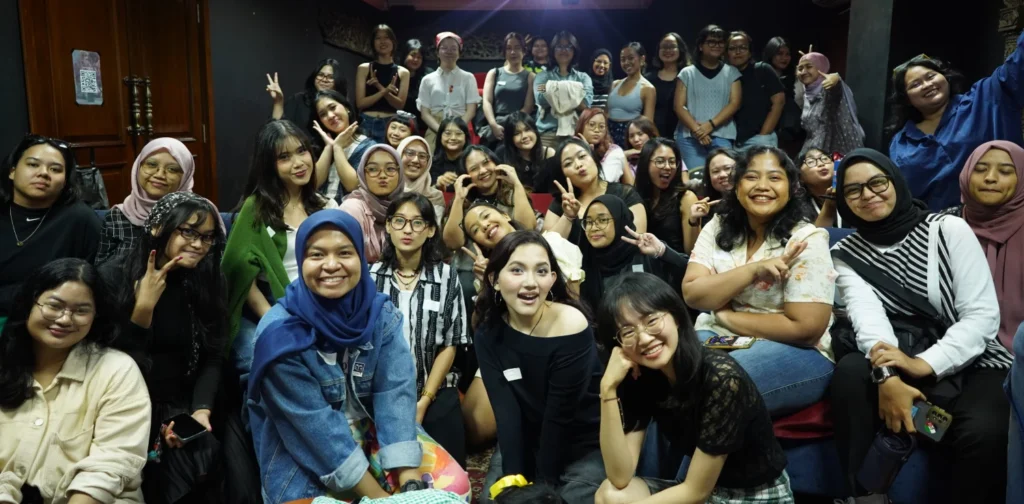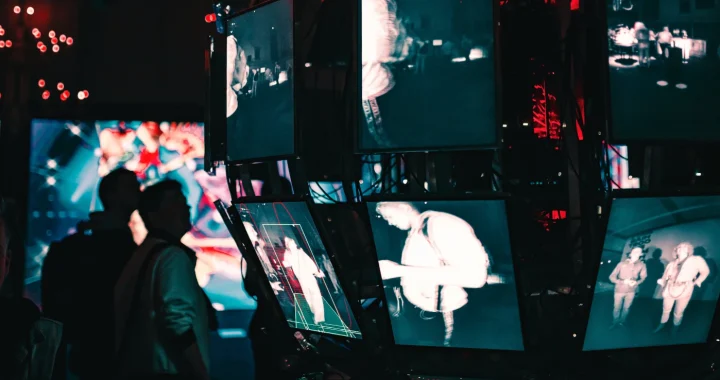Klub Rumah Dara: Amplifying Women’s Voices Through Cinematic Discussions

Photo: Dina Oktaferia.
Arts, including motion pictures, do not exist in vacuum. The identities, life experiences, and perspectives—such as genders, sexualities, and political views—of the creators and the audiences shape every nook and cranny of the arts involved. The experience of women filmmakers, for instance, differs from their male counterparts’ and can determine the messages they incorporate into their works as well as how those are received by the audience. Against the backdrop of this patriarchal industry and society, Klub Rumah Dara exists as a safe space to enjoy and discuss films through the feminist lens.
Klub Rumah Dara and Its Curation
Yoan (33) created Klub Rumah Dara, a film club whose members consist only of women and non-binaries, in February 2025. Since then, Klub Rumah Dara has been encouraging its enthusiastic members to participate in cinematic discussions through weekly film assignments and meetings. The discussions may happen in person or online as the club is based in Jakarta, Indonesia, and the digital space.
As a film enthusiast myself, becoming a part of Klub Rumah Dara after a friend’s generous invitation has been immensely empowering. Behind this experience is the masterful curation and intricate discussions within it. I got to talk to Yoan about this process and her perspective on creating a community space for women cinephiles.
“Mainly, the films we curate are either directed by women or stories about women,” said Yoan.
In the subject of feminism, Klub Rumah Dara embraces intersectional disciplines through their film picks. “The Gleaners and I” (2000) directed by Agnès Varda was their gate to explore environmental issues. In June, they held an offline screening for a queer movie, “But I’m a Cheerleader” (1999) directed by Jamie Babbit, to celebrate Pride Month.
Discussing the Film Industry
Of course, films are more than their makers. In the act of appreciating motion pictures, the discussions brought by the members Klub Rumah Dara essentially center three female entities: the workers, the characters, and the audience.
During our talk, Yoan addressed the gender-based disparity in the film industry, which lacks the space for and celebration of women directors. Instead of giving equal opportunity to women, the topic of feminism often gets commodified on superficial levels just to appease the public.
The discussions also include the issues of workers’ rights in the film industry. Among them is how the creative industry is grappling with the integration of Artificial Intelligence (AI) and what it means for workers. Moreover, workers’ rights issues disproportionately impact women and the intersectional identities within them.
Characters and Representation
Meanwhile, when talking about characters in films, the matter of representation often surfaces. In “Killers of the Flower Moon” (2023), for example, Martin Scorsese attempted to tell a story connected to the history of native Americans, specifically the Osage Nation. The discussion would be about whether Scorsese’s effort to deliver the source material faithfully and respectfully is reflected through the stunning performance of Lily Gladstone as Mollie Kyle, the survivor of Osage Indian murders.
Additionally, representation is important to bring hope to the audience, particularly minority groups. Seeing a character with similar physical features, identities, and idiosyncrasies as them might help people to navigate their lives in finding the sense of belonging, similar to how Klub Rumah Dara fosters acceptance to its diverse members.
The Audience and the Community
The increase of female film reviewers might progressively contribute to developing the film industry, especially in Indonesia. The insight gained from female audiences can be used to forecast creative demands in the future. After all, the balance of amplified diverse opinions from all genders in public spaces would be a step toward gender equality in the film industry.
Furthermore, Yoan believes that movies can be a suitable medium to spark a discussion revolving around various topics, including the personal lives of Klub Rumah Dara’s members. Hence, as a community manager, she strives to make the club as safe and as inclusive as possible for its members.
I have witnessed the members’ eagerness to voice out their own perceptions of the movies and their realization of a thread that connects fiction to their material conditions. As I’ve said before, it is an empowering experience. The disclosed struggle the Klub Rumah Dara members apparently share makes me believe that a community, even if its creation simply stems from a hobby, does not merely function as a platform for networking, but it can also be a pioneer for change.
Editor: Nazalea Kusuma

Co-create positive impact for people and the planet.
Amidst today’s increasingly complex global challenges, equipping yourself, team, and communities with interdisciplinary and cross-sectoral insights on sustainability-related issues and sustainable development is no longer optional — it is a strategic necessity to stay ahead and stay relevant.
Dina Oktaferia
Dina is a Reporter & Research Assistant at Green Network Asia. She is a Law graduate from Gadjah Mada University with a passion for community engagement. She has particular interests in labor, the study on gender and social class, and journalism.


 Call for Governance: Grassroots Initiatives Look to Scale Efforts to Conserve Depleting Groundwater
Call for Governance: Grassroots Initiatives Look to Scale Efforts to Conserve Depleting Groundwater  Integrating Environment, Climate Change, and Sustainability Issues into Education Systems
Integrating Environment, Climate Change, and Sustainability Issues into Education Systems  Finally Enforced: Understanding the UN High Seas Treaty
Finally Enforced: Understanding the UN High Seas Treaty  Risks and Opportunities of Submarine Communication Cables for Sustainable Development
Risks and Opportunities of Submarine Communication Cables for Sustainable Development  Rising Attacks and Violence Against Land and Environmental Defenders
Rising Attacks and Violence Against Land and Environmental Defenders  Unveiling Potential Technological Risks amid Global Crises
Unveiling Potential Technological Risks amid Global Crises